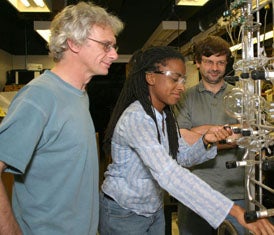Laboratory Kinetics
General Scientific Objectives:
- Understand the oxidation mechanisms of organic compounds in the atmosphere.
- Study the reactions and cycling of atmospheric free radicals (HOx, NOx and halogens).
Research Tools:
- Stainless steel environmental chamber, 50-L, temperature-regulated, interfaced to an FTIR spectrometer and GC-FID system (for mechanistic studies and relative rate coefficient determinations).
- Teflon chamber, 10 m3, for atmospheric organic mechanism studies. In addition to basic chamber characterization and control instrumentation (flow rates, ozone, temperature, particle size distribution, relative humidity, pressure, and light control), gas chromatography (GC), proton-transfer reaction – mass spectrometry, and chemical ionization mass spectrometers (CIMS) are available for chemical characterization of chamber contents.
- UV/visible absorption spectrometer system.
- Flash photolysis system – Pulsed excimer laser; near-IR diode laser absorption system for time-resolved detection and kinetic studies.
Major Research Foci:
- Oxidation mechanisms of and OH/Cl/NO3 site-of-attack on oxygenated and multifunctional organic compounds.
- Reactions of organic peroxy radicals (e.g., reactions with HO2, unimolecular processes, formation of organic nitrates).
- Development and use of the GECKO-A fully explicit chemical mechanism generator.
- Reaction mechanism development; structure-reactivity relationships.
- Impact of VOC emissions from wildfires on air quality and environment.
- Oxidation mechanisms for biogenic compounds.

Geoff Tyndall (left), ACOM SOARS protégé Cherelle Blazer (center), and John Orlando conducting experiments in the FTIR lab.
ACOM Type
Laboratory Kinetics